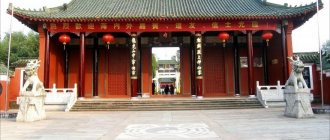Despotism
Despotism translated from Greek means unlimited power .
Today, by despotism we understand a certain form of state in which all power is concentrated in the hands of one ruler-ruler, as a rule, a hereditary monarch who rules the state through the military-bureaucratic apparatus. This form of government as despotism was characteristic of the Ancient East, for example, of Ancient Egypt, Iran, India, and China.
By the way, this is where the concept of eastern despotism comes from.
Characteristic features of a despotic form of power
- complete arbitrariness of power;
- absolute lack of rights for the people.
Basic provisions of a despotic state
- The will of the tyrant is law;
- The personality of the tyrant is divine;
- The monarch is the supreme owner of the land;
- The power of a despot is unlimited.
Reasons for the emergence of despots
Historians note that the main reason for the emergence of limitless despotism is the long-term preservation of the communal way of life .
Let us recall that in a communal system, all members of the community cultivate the land together or transfer plots of land for temporary use to families. In this system, there is still no private property, so state power usually appears in this form as despotism. Imagine a small group of people (community), where everyone works together to cultivate the land for further harvesting, in order to feed themselves. In power is the tribal leader, who controls this entire community, makes important decisions, gives orders about who should do what. Gradually, the community grows, turns into a settlement, a city, a state, and power remains in the hands of one tribal leader with a handful of close relatives who can give advice. But at the same time, nominally all power is still concentrated in the hands of one person - this is how despotism begins.
It is this late primitive communal system, with the long-term preservation of general rules for everyone and with one leader, that gives rise to the form of power known as despotism. And given the absolute power of the monarch and his deification, few resisted the fact that the heirs of the tyrant would be in charge.
A classic example of tyranny is Ancient Egypt. In power is the pharaoh, the son of Ra (the sun god). Legislative, judicial, executive and military powers were concentrated in his hands. The people were completely dependent on their monarch.
Despotism was traced in Babylonia, Assyria, the Persian Empire, Ancient India, China, Iran and many others. Each individual state had its own characteristics, for example, sometimes the despot was not deified.
Tyranny in action
Supreme ruler through intermediaries:
- Organized public works;
- Collected taxes;
- Built irrigation structures - additional watering of land (necessary for effective farming);
- Provided protection from external enemies;
- Captured the lands of external enemies.
All this required the formation of departments: the department of military affairs, internal affairs and public works, and at their expense the despotism could function.
There were no laws as such; the supreme ruler used a policy of intimidation. And the effective tool in this was the divine cult. The priests became so powerful that they even administered justice, but still despotism did not give them too much power.
Human rights under tyranny
1. Preservation of the communal system
The primitive communal system did not give up its positions, which means that there could not even be any talk of private property, all family members were collectively responsible and the crimes of one fell on the shoulders of all members of the community.
2. Consolidation of social inequality
Those close to the monarch by birth still had advantages, but as for slaves, freedmen and other categories of free people, their rights were infringed.
3. Religious background
Law was closely connected with moral responsibility and religious canons. For example, in honor of the celebrations of a particular god, it was forbidden to cause disturbances in the streets. Any offense was at the same time a violation of the canons of religion.
4. Oral standards of morality
Even when the state used written sources, the law still remained oral and was passed on as customs from generation to generation.
5. Reinforcing common cases
In legal practice, the despot prescribed specific cases, and then based them on the interpretation of justice in other cases.
6. Formalism of law
Legal norms remained in their infancy for a very long time.
The development of Eastern countries with a despotic form of government was slowed down due to:
- Excessive centralization of management;
- Archaism of legal norms;
- Disenfranchisement of the people;
- Stagnation of social relations.
But on the other hand, despotism slowed down the development of countries so much that Western civilization entered the arena of the outside world and replaced Eastern civilization in this field.
Source
Features of Eastern despotism in the development of ancient states
One can say without exaggeration, all states of the Ancient East passed through despotism as a form of government in their development. This is Babylon - a state located in the valleys of the Tigris and Euphrates rivers,
China, India, India, Urartu, ancient Iran (Persia).
The history of the formation and development of these countries had a number of specific features that contributed to the concentration of political, military and, often, religious power in an unlimited form in the hands of one person. The ruler became a despot - the sole owner of the state (despotos - in Greek “owner”, “lord”, despoteia - “unlimited power”).
Signs that distinguish eastern despotism:
• Heredity of power, monarchy.
• Unlimited power, the ruler concentrates in his hands all functions and powers, including legislative, executive, judicial, and military.
• Consolidation of the state around the center.
• Excessive number of officials, bloated administrative apparatus.
• Land property is owned and controlled by the ruler.
• Deification of the ruler, religious power is concentrated in his hands.
The phenomenon of the emergence of Eastern despotism is associated with the natural and climatic conditions in which the states of the East existed. The territories of these countries were located in arid, desert or mountainous areas with insufficient rainfall. Agriculture in these zones was based on artificial irrigation. Droughts, fires, dust storms
constantly threatened the population of these countries with famine. Therefore, maintaining human life required the creation of permanent supplies of food and seed materials, the construction and maintenance of large irrigation systems.
Irrigation agriculture
and the formation of public reserves required the participation of a large number of people and, accordingly, created a structure of managers capable of organizing and controlling such work.
Private farmers or individual communities did not have the opportunity to fully exist in those harsh natural conditions. To survive, people had to unite and obey.
Thus, the life of society in the ancient states of the East was built on the principles of collectivism.
Here, public tasks and state goals prevailed over personal interests
.
The individual was subject to strict state control , which extended to all manifestations of human life:
work, family, culture, and the social sphere.
A person was deprived of the right to freedom: spiritual, economic, political, sometimes physical, as well as to express individuality.
An important and significant manifestation of Eastern despotism for people of that time, without a doubt, was religion.
Religion legitimized the unlimited power
of a despotic ruler.
He could be declared the incarnation of god on earth, his representative or viceroy, as happened in Ancient Egypt, Assyria or the Sumerian state.
His power was often reinforced by religious teachings, such as those of the Brahmins in India. In China, the ruler acted as
. ” The divine origin of the despot explained to people his possession of unlimited power and its transfer by inheritance within a single dynasty.
The foundation of the political structure of eastern despotism were officials who ensured the functioning of the state's power apparatus. An important role was played by the army, as well as representatives of religion (priests, brahmins). The military bureaucracy, subordinate directly to the ruler, controlled economic development and protection of communities. Thus, power acquired strict centralization, and society acquired a clear hierarchical structure.
Ancient Eastern despotism was carried out through several main spheres of government: military, financial and public works management.
So, the main socio-political signs of eastern despotism were:
• Concentration of power, its concentration in the person of a single ruler - a despot (monarch, pharaoh).
• Centralization of power and the formation of a complex hierarchical structure of society.
• Bureaucratic apparatus supported by the military.
• Subordination of society to religion, sacralization of power and ruler.
• Preservation of the communal system.
The communal organization firmly connected the states of the Ancient East with the despotic monarchy,
as the only form of government capable of maintaining the existence of these states during that period of time. For hundreds of years, communities ensured the sustainability of despotic rule by filling the state treasury with taxes and rents.
Thus, eastern despotism was determined by the development and specifics of the social structure of that time. The despotism format had the opportunity to rally the forces of the population to achieve the most important goals: organizing irrigated agriculture and building irrigation systems, as well as defense against enemies and waging wars of conquest. At the same time, Eastern despotism prevented the formation of individuality and the formation of a free personality, which determined the specifics of the further development of the states of the East.
Definition of the word in explanatory dictionaries
The sacred meaning of words is not hidden at all, and it is quite possible to find out the meaning of each. To do this, people turn to similar articles or scratch the pages of textbooks. New words enrich a person’s stock of knowledge and give him intelligence. They also allow guys to show off their knowledge in an unfamiliar company or for guys in front of a girl.
But enough background, it’s time to find out the meaning of the word in explanatory dictionaries. For a better understanding, all definitions have been simplified and reduced to enthymemes.
- Historical Dictionary. Despotism is a form of government characterized by authoritarianism, but the power of the despot is not limited by law. Power is transmitted through hereditary connections, a similar form of governance in nature for states that in ancient times were located in the east.
- Dictionary of foreign words of the Russian language. This is the power of violence and arbitrariness; people are constantly kept in fear of the despot. Power is determined by religious or other dogmas. The despot is the only one who makes decisions in the state, however, realizing that he cannot rule alone, he takes into account the interests of his entourage.
- Historical dictionary of Gallicisms of the Russian language. Despotism is the unlimited power of one person who personally decides key issues, but relies on the opinions of the people he needs. The power of a despot can be shaken due to a lack of despotism, just as cunning people perish from a lack of cunning.
- Ushakov's explanatory dictionary. This is a state that is solely controlled by a dictator (despot). He does not rely on laws, and if necessary, he invents them himself. The power of such a person is not limited by anything except the need to maintain the power itself. The despot retains his throne thanks to a complex bureaucratic system devoted to him. This form of governance was predominantly manifested in the East.
- Synonym dictionary. The unlimited power of one person, which is supported by the local elite and religious dogmas. A characteristic feature of this form of government is the completeness of power in one hand.
"EASTERN DESPOTISM"
“EASTERN DESPOTISM”, a term found in scientific literature. lit-re; used to characterize the social system and government structure in the countries of the East. For the first time the concept of “V. d." appears in the works of the French. encyclopedists who relied on meager, and sometimes fantastic, literature. information gleaned from ancient authors and Western Europeans. travelers. From the works of the classics of Marxism-Leninism, who adopted this concept from the philosophers of the 18th century, it passed into the Soviet Union. historical science, where it was used very widely. However, a strict definition of the concept “V. d." No. In its most general form, it meant individual power that was not limited by anything or anything; the question of whether such power existed anywhere and ever was not discussed.
In the West, this term was also quite widely used, especially after the publication of his work. scientist K. A. Wittfogel (1896–1988), who put forward the so-called. irrigation hypothesis, according to which the state in the Ancient East arose out of the need to build large-scale irrigation systems and centrally control the distribution of water, which, according to the scientist, was possible only in the presence of a despotic government. authorities. Wittfogel's theory quickly became fashionable, but did not withstand contact with facts and was criticized.
In general, the concept of "V. d." does not correspond to modern ideas about history process: 1) not all cultures of the Ancient East were irrigated (for example, Assyria, Ebla, early China). In other cultures, irrigation networks, as archaeological materials show. excavations and aerial photography were mainly created in the pre-state and early state periods, the periods of city-states and small territorial states (which agreed among themselves on the joint construction of main canals and the distribution of water from them). In general, the problem of the emergence of the state as such and large centralization. a territorial state, and then an empire, is much more complex and is associated with a large number of factors (psychological, economic, ideological, technical, etc.). 2) In the Ancient East, much more attention was paid to the duties of the king than to his prerogatives (which was not known to ancient authors). The king means. degrees were viewed as a leader, obliged to take care of everyone, as a caring shepherd. The king received his charisma, no matter what it was called in one culture or another, from the gods and could lose it. The decrees of the ancient kings and their inscriptions necessarily contain long lists of their merits and positive qualities: the kings are constantly “justified”, which constitutes a striking contrast with the simple and full of calm dignity of the republican formula “The Senate and the Roman people decide...” in Ancient Rome. Contrary to popular belief, the deification of kings in ancient times was the exception rather than the rule. In Ancient Egypt, it is most likely explained by an important and unique feature of Egypt. history - the very early appearance of powerful centralization here. state, covering the entire Nile Valley, in fact - a leap into centralization. the state is almost straight from primitive times (from the Chalcolithic). 3) Only at the end of antiquity, with the emergence and spread of a new type of state - an empire - and with the ideological changes that took place at the same time. and social-psychological. changes appear and affirm new ideas about the essence of royal power and the role of the monarch standing above the laws. In Europe they never reached completion and practicality. design (although theoretically formulated back in the Digests). These are exactly the east. monarchs, like the Sultan in Turkey, the Shah in Iran, the Great Mogul in India and the Bogdykhan in China, and served as Europeans. thinkers with examples on the basis of which the idea of “V. etc.,” which was then transferred to antiquity. See also Despotism.
More about despotism
As we learned, despotism is a special form of government when all power is vested in the monarch. Such power is not regulated in any way, and there are no laws for a despot. He himself decides the destinies of people and is the supreme ruler, priest, manager, and so on.
Its governance is based on bureaucracy and military resources. It is worth noting that power in the countries of the post-Soviet space practically exists on this. All states have a large administrative apparatus and a high concentration of law enforcement officers per 100 thousand people.
Where is it most often found?
The location of the states under the control of the despot was in the East. European countries were not affected by despotism, but there was tyranny in them, which is relatively better than one-man rule without regulation by legal norms.
Despotism, examples of countries:
Fortunately, despotism did not migrate to other countries. There is not a single country in the modern world with such a form of government. Unless North Korea can be classified as a despotic state, and now we’ll figure out why.
A golden cage for a despot
Despotism is not inviolability. The monarch lived as if in a golden cage, as he was bound by many restrictions. For example, his life was clearly regulated by palace etiquette, conventions and prejudices. Often this was all done in order to protect the sacred monarch. However, sometimes a ruler could even be killed simply because, in the opinion of the astrologer, his life on earth had expired. There is no need to explain why there was always a soothsayer at the courts. Any ruler was interested in having an astrologer prolong his life as much as possible. As a result of this, it was astrologers who played the role of “gray cardinals”, since, paradoxically, the life of the semi-divine ruler depended on them.
Features of despotism
Like any social phenomenon, one-man rule is characterized by something:
- Power lies with one person.
- Governance of the state is inherited, practically a monarchy.
- Power is supported by a religious cult.
- The personality of the despot is idealized.
- Normal opposition is prohibited, as is criticism of the dictator.
- A large number of people in the administrative resource.
- The feeling of danger is constantly intensified, which justifies the costs of the military, of which there are a lot under an oppressive form of government.
Some characteristic features of despotism are evident to this day. You can find many of the points in your country, but they will not be so radical. Despite the apparent completeness of power, the despot does not rule alone. Often he is a convenient ruler through whom the elites resolve their issues.
Characteristic features of eastern despotism
Firstly, this is the religious content of the power of the despot ruler. The monarch under despotism is considered a living god, his incarnation. Accordingly, his power was given by none other than the Almighty himself, and was absolute.
The monarch was considered the only judge, the measure of the legality of any act. Everything spoke about this: from the attitude towards the monarch to his title. Such a formulation of the problem of power was supposed to unite society. And she united. After all, if power is given to the monarch from above, if it is given to him from God, then it is simply useless to contradict the ruler. This is stupid, since divine power is by definition wise and aimed at the good of the people. That’s why the despot’s power held on; the people were simply afraid to go against their ruler. Moreover, he was considered none other than the high priest or head of the entire priestly hierarchy. Let us consider other characteristic features of despotism.
Ancient Eastern despotism
The most striking form of despotism is the rule of the pharaohs in Ancient Egypt. If other despots built relatively insignificant structures in their honor, the pharaohs forced them to erect massive temples and build tombs in the form of pyramids.
In its form, despotism appears to be a theocratic monarchy, where the word of a single ruler is literally a phrase torn from the lips of God. Of course, managing the state required a powerful and extensive administrative apparatus.
Social strata were felt very strongly, and the correlation between the poor and the rich was clearly visible. For example, in India, society was divided into castes. A lower-ranking woman could not marry a man of higher rank. The army was used to restrain people, it suppressed uprisings and established order in troubled provinces.
How was despotism created?
Normal logistics systems for the supply of water and other food products did not exist in the ancient world. And the whole life of society consisted of self-reproduction and agriculture; rich residents could devote themselves to developing science.
Communities tended to be closer to water sources. They made contact with other formations, but this did not always go smoothly. To simplify relations between communities, one person was introduced, whose word was law for everyone.
Source
Responsibilities of a Despot as Head of the Priestly Hierarchy
He had full authority to perform all religious ceremonies related to birth and the fertility cycle. In some cases, the ruler could even abolish the veneration of the old gods and establish a completely new cult (as happened in Egypt).
But what the reigning monarch should never have done was take part in rituals associated with death. This was partly due to the fact that divine power could only bring good, only win, but not sow death and grief. In addition, sometimes rulers introduced their own cult. This created the impression of inviolability and sacredness of the ruler’s body. Consequently, the attempt could be equated to sacrilege, an act against God (or gods) and was punished in the most severe manner. For example, an unlucky murderer could be executed, expelled, and the like. But not everything was so smooth.
Despotism
Despotism
(from ancient Greek δεσποτία) - unlimited power. One of the fundamental characteristics of dictatorial rule, which is associated with arbitrary power, enhanced by the concentration of political power in the hands of the head of state, the absence of the principle of separation of powers, the suppression of dissent by any means, the use of the army to reinforce the actions of the state apparatus in order to implement a monopoly on power. Decision-making is impulsive, explained by the desire to change or discipline society.
Despot
(from ancient Greek δεσπότης - lord) - a sovereign ruler (not to be confused with a usurper ruler - tyrant).
Despotism
Despotism is a form of government, a type of autocracy, in which the supreme state power is concentrated in the hands of an absolute ruler or a narrow group of people who have the right to freely control the fate of their subjects, that is, in despotism, an autocratic monarch is not only the ruler of his state, but also the master of his subjects.
Aristotle wrote in his work “Politics” that the power of a sovereign is similar to the power of a master over slaves.
The despotisms were the states of the Ancient East and Ancient Africa: Assyria, Babylon, Ancient Egypt, ancient Indian states, Chinese empires, Achaemenid Persia and Sassanid Persia. In addition, the classical despotisms were the Greek tyrannies, the Mughal state of India and the Ottoman Empire.
Despotism - what is it?
Let's start with the most general definition of this word. So, despotism is a specific form of state when all power belongs exclusively to the monarch. Such power is not regulated by law, the monarchy is usually hereditary, and the ruler rules based on the military-administrative apparatus.
Most often, despotism was found as a form of government in the ancient Eastern empires. For example, in Egypt, Assyria, Persia, Babylonia, China, India. Naturally, in this case, the word of the despot was law and was not discussed. It was during the times of despotism that the most stupid and bloody laws were adopted. And this is not surprising, since the personality of the ruler was deified. A striking example of this is the Egyptians. Even after death, the pharaoh was equated with a god and was given appropriate honors. Despite the fact that the power of the despot was de jure unlimited, de facto this was not the case. The activities of the despot were limited and often even subordinated to the interests of a narrow circle of the nobility. Thus, despotism is a convenient form of government for elites and often coexists with oligarchy.










